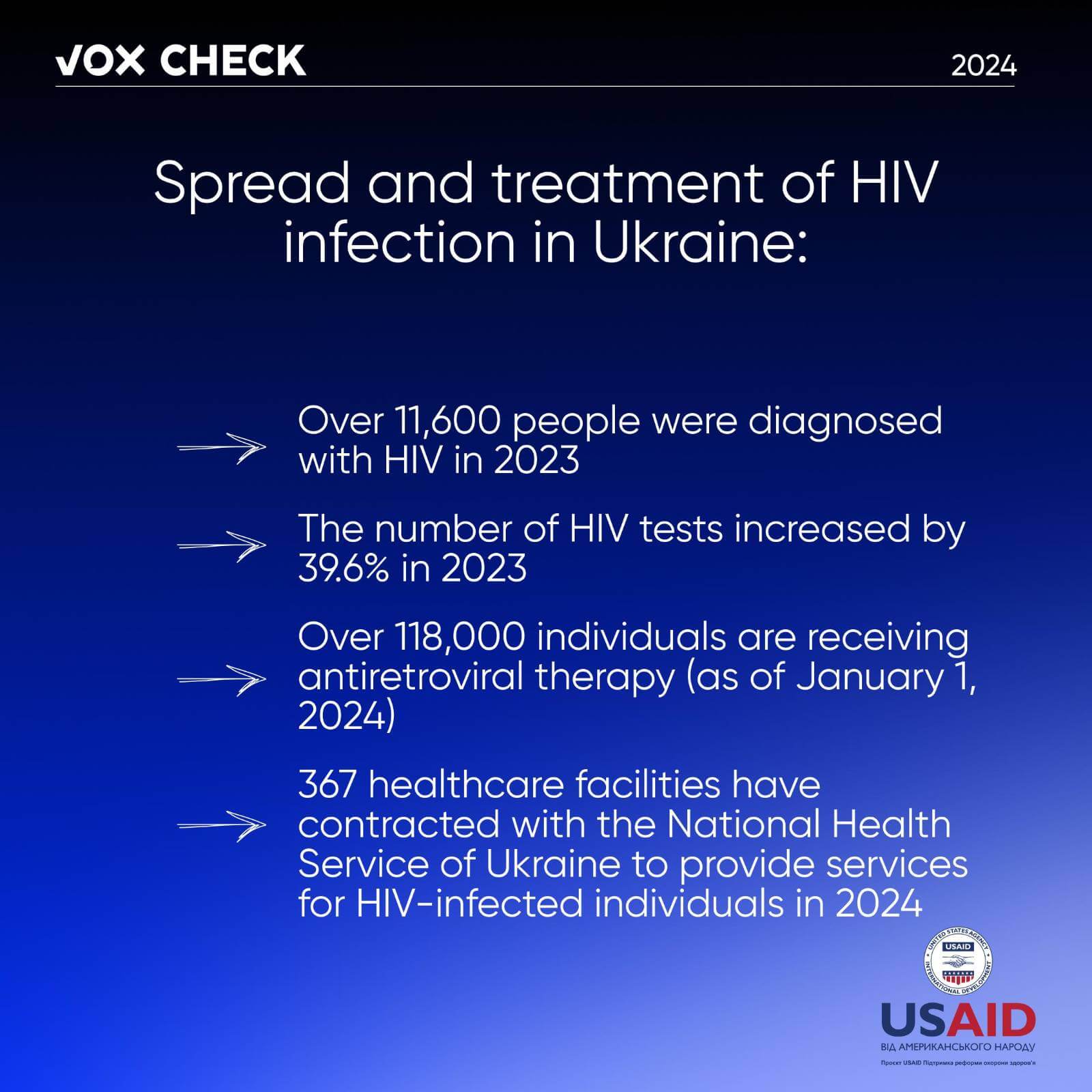The agenda of Russian Telegram channels once again revolves around the same topics — “mass illnesses” among Ukrainians and the “destructive” influence of the USA on Ukraine’s healthcare. Authors of fakes claim that due to the “inaction” of the Ukrainian government, HIV and hepatitis B and C are spreading “massively” among military personnel. However, these are not all the “problems” of Ukrainians. According to Russian fabrication, they are supposedly facing a mass gender change ahead. Promoting such ideas in Ukraine, as Russians write, will be done by the “American clan of billionaires.”
With the support of the USAID Health Reform Support project, VoxCheck analyzes and refutes public health narratives spread in the information space of Ukraine, Belarus, and russia on a weekly basis.
Disinformation: Among the military personnel of the Armed Forces of Ukraine, HIV and hepatitis B and C are spreading massively
The Kremlin-backed Telegram channels are circulating a screenshot from an article in the Ukrainian publication “Fakty” and claim that Ukraine has “finally taken notice” of the problem of HIV and hepatitis B and C spread. They allege that infectious diseases are spreading “massively” among military personnel, and the lack of medical assistance and sometimes even its prohibition only worsens the situation. Therefore, the government has resorted to “extraordinary measures” — free testing for military personnel for the presence of the aforementioned diseases.
What’s the reality?
In fact, the “Fakty” article does not mention “massive” spread of HIV and hepatitis B and C among military personnel. The author of the article writes about a pilot project established at the Main Military Clinical Hospital in Kyiv. Within the framework of the project, military personnel will be able to undergo rapid testing for HIV, hepatitis B and C, and if the disease is confirmed, receive appropriate treatment.
Human Immunodeficiency Virus (HIV) is an infection that affects the body’s immune system. It is transmitted through blood and biological fluids during sexual contact, pregnancy, childbirth, or breastfeeding. AIDS, on the other hand, is the final stage of HIV infection.
According to the Public Health Center, throughout the year 2023, over 11,600 cases of HIV infection were recorded among Ukrainians. The highest number of cases per 100,000 population were registered in the Dnipropetrovsk, Odesa, Mykolaiv, and Kyiv regions. Moreover, the HIV infection rate in Ukraine decreased by 5% compared to 2022. However, there are no official data regarding HIV infection among military personnel. Therefore, all claims by Russians about the “massiveness” of HIV infection among soldiers are unfounded.
Hepatitis B and C are infections that affect the liver and can cause acute or chronic illness. They are transmitted during childbirth, unprotected sexual contact, the use of non-sterile injection equipment, and so on. The best way to prevent hepatitis B is through vaccination. Meanwhile, practicing hand hygiene, safe medical injections, and using contraceptives can help prevent hepatitis C infection.
Infectious cases of hepatitis B and C were recorded in 759 and 439 residents of Ukraine, respectively, throughout the year 2023. However, the number of military personnel diagnosed with these diseases is also unknown.
Additionally, Russians are spreading false information about the absence of medical assistance for military personnel. Both military and civilians have been able to undergo free testing for HIV, hepatitis B and C previously. Specifically, individuals with HIV infection can contact the national HIV/AIDS hotline at 0 800 500 451.
The Medical Guarantees Program also includes a package for “Diagnosis, Treatment, and Support for Persons with HIV Infection”, which provides free services such as testing, laboratory tests, medical supervision (antiretroviral therapy, provision of medications, monitoring of side effects), and more.
People living with HIV can receive antiretroviral therapy medications for free at their place of residence. To do this, they should contact the AIDS Center or the “Dovira” office in any region of Ukraine. As of January 1, 2024, over 118,000 individuals are undergoing antiretroviral therapy. In total, 367 healthcare facilities have contracted with the National Health Service of Ukraine to provide services for HIV-infected individuals in 2024.
Disinformation: The USA will lobby for mass gender change in children in Ukraine
Russian political analyst Maliek Dudakov wrote in a Telegram channel that, allegedly, Ukraine would face mass gender change. According to him, the “American billionaire clan” of the Pritzkers actively promotes the topic of transgender transition among children and profits from it. However, one of them, Penny Pritzker, has become a “watcher” from the USA over Ukraine, so, allegedly, this policy will soon be implemented in Ukraine, leading to mass gender change.
In the post, he also cites research indicating that children who agreed to undergo hormonal therapy at the age of 10 changed their decision in most cases by the age of 25.
What’s the reality?
Malek Dudakov is a Russian political analyst and Americanist who frequently appears on the propagandistic show “Evening with Vladimir Solovyov”. In his speeches, he claims that the West is using Ukraine to achieve its own goals and also asserts that Victoria Nuland acknowledged the existence of US biolabs in Ukraine. The latter fake we debunked in one of our previous issues.
Penny Pritzker is the Special Representative of the United States for Ukraine’s Economic Reconstruction. Her duties include cooperation with the Ukrainian Cabinet of Ministers, G7 countries, the European Union, international financial institutions, foreign partners, and the American private sector. She also collaborates with the Ukrainian government on economic reforms, market opening, and so forth. Therefore, her position does not involve implementing reforms in the healthcare system.
Currently in Ukraine, psychiatric assessment of a child with symptoms of dysphoria and therapeutic intervention (administration of hormonal medications) are conducted up to the age of 14 with the informed consent of both parents; after the age of 14, with the consent of both parents and the child. Surgical intervention in transgender transition is allowed only from the age of 18. The Ministry of Health of Ukraine has not announced any intentions to change or simplify these rules.
International partners of Ukraine, including the USA and the EU, have also not publicly called for a change in policy regarding transgender transition for children. Instead, partners have urged to combat discrimination against the LGBT community in Ukraine, such as including punishment for incitement to hatred or violence based on sexual orientation or gender identity in Article 161 of the Criminal Code, as well as improving the representation of women at all levels of political and social life. In particular, the head of the Department of Anti-Discrimination of the Council of Europe, Hallvard Gorseth, spoke about the discriminatory ban on same-sex marriage.
The condition in which a person experiences discomfort due to a misalignment between their gender identity and the sex assigned to them at birth (and associated gender role and/or primary and secondary sexual characteristics) is called gender dysphoria. Not all individuals with this diagnosis desire to transition through surgical intervention. Some patients may only change their gender expression. Additionally, gender dysphoria is not linked to a person’s sexual orientation. Individuals experiencing gender dysphoria can be heterosexual, gay, lesbian, or bisexual.
In the study referenced by Dudakov, researchers asked questions about gender identity to 2,772 children from the Netherlands over a period of 15 years. They specify that they interviewed children who did not have a diagnosis of gender dysphoria. As a result, 78% of individuals throughout the entire study period identified with the gender they were assigned at birth, 19% reported a decrease in gender dissatisfaction over time, and 2% indicated an increase in gender dissatisfaction.
In turn, in 2022, American scientists published a study involving 208 transgender girls and 109 transgender boys aged 3 to 12 years old, which showed that after five years, 94% of the children continued to identify with the gender they had previously identified with. Additionally, in 2019, researchers in the USA found that regardless of how much time had passed since the social transition of transgender children, they identified with a gender different from the one assigned to them at birth.
Furthermore, a study on the mental health of transgender children in the USA found that individuals who experience gender dysphoria and live with a gender that matches their biological sex have significantly higher levels of psychopathology compared to children who have undergone social transition, meaning they have changed their gender identity without surgical intervention. Therefore, these studies demonstrate that gender dysphoria is not imposed on children. The feeling of incongruence with the gender assigned at birth is influenced by genetic and social factors. In some countries, including the USA, authorities support transgender transition to relieve discomfort in individuals with dysphoria.
This information piece was produced with the assistance of the United States Agency for International Development (USAID), provided on behalf of the people of the United States of America. This article’s content, which does not necessarily reflect the views of USAID, the United States Government, is the sole responsibility of Deloitte Consulting under contract #72012118C00001.
Attention
The authors do not work for, consult to, own shares in or receive funding from any company or organization that would benefit from this article, and have no relevant affiliations





